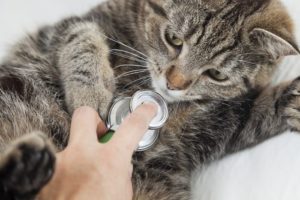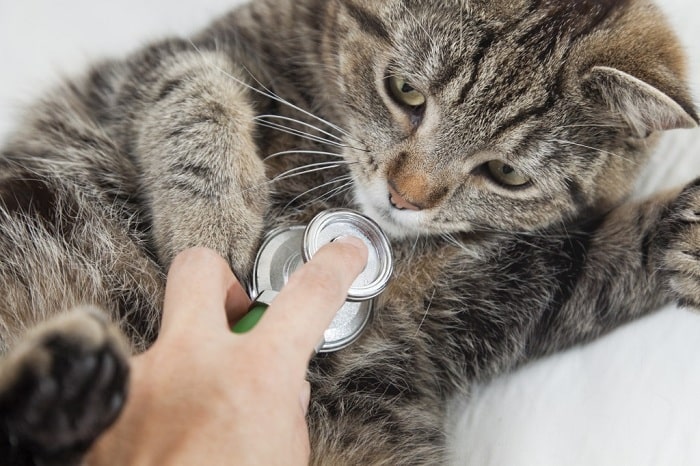Regularly deworming cats is extremely important to ensure their health and development. However, many people wonder how long it takes for cats to take deworming medicine before they can eat. This article will provide detailed information on this issue, and share some important notes when giving cats deworming medication.

1. Deworming schedule for cats:
Cat deworming schedule depends on the cat’s age and health condition. Below is the recommended deworming schedule:
Kitty
- 3 weeks old: Their deworming journey begins! Start with their first dose of a kitten-specific dewormer.
- 2-3 months old: Repeat the deworming treatment every 2 weeks, ensuring continuous protection during this vulnerable stage.
- 3-6 months old: As they grow stronger, switch to a monthly deworming schedule.
Adult cats
- Healthy cats, no signs of worm infection: Deworm every 3 – 4 months.
- Cats have hunting habits: Deworm every 2 – 3 months.
- Pregnant or lactating cats: Deworm once before mating and once 1 week before giving birth.
- Newly purchased or brought home cats: Deworm immediately and again after 2 weeks.
2. Time to feed cats after taking deworming medicine:
Normally, cats can eat about 2 – 4 hours after taking deworming medicine. However, this time may vary depending on the type of dewormer and the cat’s constitution.
With some deworming medications: Cats can eat immediately after taking the medication.
With some other deworming medications: Cats need to fast before and after taking the medication according to the instructions on the packaging.
Note:
You should read the instructions carefully before giving your cat deworming medicine.
Give your cat the correct dose according to the instructions.
Monitor your cat’s condition after taking the medicine. If your cat shows unusual symptoms such as vomiting or diarrhea, contact your veterinarian immediately.

3. Some notes when giving cats deworming medicine:
Deworming your feline companion is vital for safeguarding their health and well-being. But navigating the process can seem daunting, especially with various factors to consider. Worry not, pawsome pet parent! Here’s a comprehensive guide to deworming your cat safely and effectively:
1. Choosing the Right Weapon:
- Know your foe: Identify the type of worms your cat might be susceptible to based on age, lifestyle, and environment. Consult your veterinarian to determine the most effective dewormer.
- Age & size matter: Opt for a dewormer specifically formulated for your cat’s age and weight. Kitten dewormers differ significantly from adult formulas, ensuring appropriate dosage and safety.
- Prescription vs. over-the-counter: While certain dewormers are available over-the-counter, consulting your veterinarian ensures the chosen medication targets the specific worms and is safe for your individual cat.
2. Assess Your Cat’s Fitness:
- Kitten considerations: Young kittens have delicate systems. Consult your veterinarian to ensure deworming doesn’t overwhelm their developing bodies.
- Sick or pregnant cats: For cats experiencing illness or pregnancy, deworming can be risky. Your veterinarian will assess their health and determine the safest approach.
- Weakened immune systems: Cats with compromised immunity require special attention. Your veterinarian will recommend the most suitable deworming protocol to avoid complications.
3. Creating a Worm-Free Zone:
- Cleanliness is key: Thoroughly clean your cat’s environment after deworming, including their litter box, bedding, and feeding areas. This helps prevent reinfection from shed worm eggs.
- Limit outdoor access: If your cat ventures outside, restrict their access to areas frequented by other animals, potential sources of worm eggs.
- Practice good hygiene: Wash your hands frequently after handling your cat’s litter box or waste to prevent transferring worm eggs to yourself or other pets.
4. Post-Deworming Care:
- Gentle on the tummy: Offer your cat easily digestible food after deworming to ease their digestive system. Avoid rich, fatty foods that might cause discomfort.
- Hydration is crucial: Ensure your cat has access to plenty of fresh water to aid in flushing out any worms and preventing dehydration.
- Monitor closely: Be observant of your cat’s behavior and stool after deworming. Notify your veterinarian if you notice any unusual symptoms like vomiting, diarrhea, lethargy, or loss of appetite.
Remember: Deworming is a crucial preventative measure, not a cure-all. Regularly scheduled vet checkups, combined with deworming based on your veterinarian’s guidance, ensure your cat enjoys a long, healthy, and worm-free life. So, arm yourself with this knowledge, consult your veterinarian, and keep your feline friend’s smile bright and their belly worm-free!

Conclusion
Regular deworming is an important measure to protect your cat’s health. Feeding cats after taking deworming medication needs to be done properly to ensure the cat’s safety. Hope this article has provided you with useful information on this issue.
